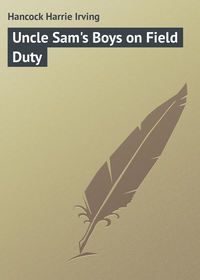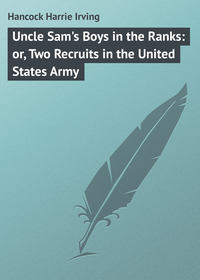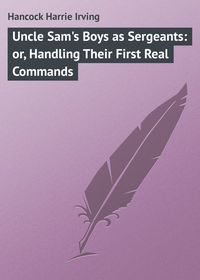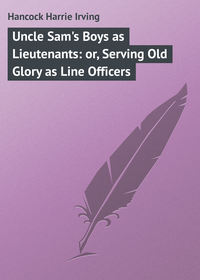 полная версия
полная версияThe Motor Boat Club off Long Island: or, A Daring Marine Game at Racing Speed
“Perhaps there’s nothing he can do here yet,” was Halstead’s answer. “I am wondering whether he’s going down to ruin, or whether he hopes to find the way out yet.”
A messenger from one of the brokers on the floor now darted through the gallery, handing a sheet of paper to Justin Bolton.
That worthy, after glancing over the sheet, penciled a few words upon it. The messenger hastened back to one of the brokers below.
Bolton’s own face, after the messenger had gone, was of a ghastly pallor. He looked unsteady, worried – or else as though he were about to take the most daring plunge of all.
“Watch out for what’s going to happen,” nudged Mr. Coggswell. That broker had now a pad on his own knee, a fountain pen in hand, as though prepared to dash off written orders in a hurry.
“Look out for a thunderclap,” whispered Coggswell, as one of the Bolton brokers on the floor hurried forward.
Then it came:
“Forty thousand P. & Y. at 60!”
CHAPTER XXII
SPRINGING THE MONEY MINE
IN an instant all seemed mad frenzy on the floor of the Stock Exchange.
Members ran about, waving slips of paper, bawling themselves hoarse, colliding with each other in efforts to reach desired parts of the floor.
Junior members of brokerage firms rushed to their private telephones to call for instructions.
Many thought that the day would go out in widespread panic, for now much more seemed involved than merely the P. & Y. Railroad.
At the first crack of this new firing on the battle line Broker Coggswell, a written order in his hand, bounded from his seat in the gallery, making his way frantically to the floor below.
Justin Bolton turned for an instant to follow the broker with his eyes. Then down below he looked to see Coggswell hurl himself into the wild chaos of the ’Change floor.
Broker Coggswell snatched up the entire offering of forty thousand shares like a flash. That held the market steady at that price for a moment. There was even talk among the excited operators that P. & Y. might be good for some rise. Gradually the hubbub lessened. Quiet followed. Every operator interested waited to see what the next move in the great game was to be.
Justin Bolton, shaking all over in his excitement at this crisis in the daring battle he had waged, stood up, leaning forward over the railing.
“Coggswell, your clients must be crazy to go in so heavily on a dropping stock,” one “bear” operator called to Delavan’s broker.
“I don’t believe it,” smiled the broker.
“But P. & Y. will be at 40 by to-morrow,” insisted the other.
“Bosh, man!” returned Coggswell, serenely.
“You think you have inside information, do you, Coggswell?” demanded the “bear,” banteringly.
“My principal client believes he has,” laughed Coggswell, good humoredly.
“Your principal client?”
“Yes.”
“I wish I knew who he is,” admitted the “bear,” moving closer to the bold broker.
“Why, I might tell you,” came the smiling retort.
It would be news of great value to many operators to-day to know who was behind the purchase of forty thousand shares of a falling stock. A crowd surged around Coggswell.
“Tell us who your client is,” dared the same “bear,” while the size of the gaping crowd increased. A hush had again fallen over everything.
“My principal client – ” began Coggswell, then paused, smiling in a tantalizing way.
“Name him!” insisted the same “bear.”
“Yes, name him! Name him!” came the fevered demand from all sides, though probably not one expected the broker to comply.
“My principal client, for whom I just made the big purchase,” announced Broker Coggswell, “is Francis Delavan himself.”
“Francis Delavan?”
The cry was taken up and repeated all over the floor. Scores of men came running to get as near as possible to the talking broker.
“I made that purchase on behalf of the Delavan-Moddridge interests,” continued Coggswell, showing a still smiling face.
“Then you must know where Delavan is?” called someone, rather banteringly.
“I do,” nodded Coggswell.
One of the Bolton brokers sent a messenger scurrying to the gallery to inform the arch-plotter.
“Where is Delavan?”
It rose as a shout, penetrating every nook and corner of the great Stock Exchange space.
“Right up there!” called Mr. Coggswell, turning and pointing toward the gallery.
At that instant Mr. Delavan stood up. As he rose he cast off the linen duster and peaked cap. In the next moment he removed the disfiguring, concealing goggles from his eyes, dropping them to the floor.
“Delavan! Yes, it’s Delavan!” rose a mighty shout.
Justin Bolton turned at the same time. He fell back, clutching at a seat, gasping, his lower jaw dropping, his eyes protruding. It must be all a wild, disordered trick of the imagination, for wasn’t Francis Delavan a close prisoner in that schooner out at sea?
But as Justin Bolton, horror-stricken and dazed, continued to glare at the calm, smiling face of his foe, it was driven home to him that here, indeed, was Delavan in the flesh.
It came over the scoundrel slowly, but crushingly. Still wildly staring, foam flecking his lips, Justin Bolton sank back in his seat.
And those below saw. While they could not comprehend it all, they knew that Justin Bolton, who was known to be the chief factor behind the “bear” movement in P. & Y. stock, plainly admitted defeat.
At all events, Francis Delavan was neither an absconder nor a defaulter, since he was here in the flesh and dared show himself. Then it was that the report of the accountants, as published in the evening newspapers, was remembered and accepted in good faith. Plainly the “bear” movement had been based on a cruel hoax of some kind.
When the tumult had begun to subside, a broker’s voice was heard announcing:
“I bid 67 for three thousand P. & Y.!”
The upward movement started then and there. Yet there were many cautious ones. Almost at the outset a score of excited operators left the floor to crowd about Francis Delavan.
The two intensely interested motor boat boys extricated themselves from that crush, standing well apart from the crowd.
“You fool!” hissed a voice in Tom Halstead’s ear.
The young skipper turned, to find himself gazing into the glaring eyes of Justin Bolton.
“In some way,” declared the scoundrel, “this is all your work!”
“Partly mine, partly that of my friends,” Tom smilingly admitted.
“You may have beaten me, but I offered you a fortune to work on my side. What do you get out of this turn of affairs?”
“The satisfaction, at least, Mr. Bolton, of knowing that I’m a decent human being, true to what little trusts may come my way.”
“Bah! That, as against a fortune!”
Then, suddenly, as though actuated by uncontrollable fury, Bolton leaped at young Halstead, gripping him furiously by the throat.
“Quit that!” commanded Joe Dawson, sternly. Without waiting the young engineer swung his fist, striking Bolton a heavy blow full in the face.
The maddened financier let go, staggering back. He reached for one of his hip pockets.
But two new actors moved swiftly into this scene. They were plain clothes policemen, provided by the thoughtfulness of Broker Coggswell. Bolton was seized, and his right hand followed to his hip pocket.
“You don’t need this weapon,” remarked one of the officers, taking Bolton’s revolver. “Calm down, man, and come with us.”
“But, good heavens, officer, I can’t leave here now,” cried Bolton, his eyes flashing fire. “I’ve millions of dollars at stake on the floor below.”
“Then calm down and behave yourself,” advised the other policeman. “If you had drawn that gun and pointed it, we’d have to take you. Behave yourself, and we’ll let you stay here and attend to your deals.”
“I’ll – I’ll promise,” agreed Justin Bolton, his words coming in a gasp.
This scene, as quickly as it had taken place, had not altogether escaped the attention of those about Francis Delavan.
“Gentlemen,” said the “Rocket’s” owner, “if you can see any connection between my brief disappearance and that scene over yonder, you’re welcome to draw your own conclusions. But I’ve nothing further to say on the subject, for the present, at any rate. My absence from the world wasn’t a matter of my own choice – that’s all. As to P. & Y., I give you my word of honor that I regard it as a splendid investment, even at 110. If there’s any man here who ever knew me to lie, let him stand back and keep out of the good things that are going to happen on the Stock Exchange to-day.”
Broker Coggswell, with the help of three of his men, was now on the floor, snapping up all P. & Y. stock that offered. The selling price was above 70.
Then Clark, one of the Bolton brokers, came rushing up in person to consult his client. The two withdrew by themselves, forming the new plan of campaign.
While Bolton had been the power behind the plot against P. & Y. stock, yet there were scores of others who had been led into selling that railroad stock “short.” They were not going to allow themselves to be wiped out without a struggle of the fiercest sort.
In fact these “shorts” now rallied about Justin Bolton, and a powerful money combine was spontaneously formed.
Francis Delavan was yet a long way from having won the day. His dramatic appearance in the gallery of the Stock Exchange had brought about at least a strong momentary rise in P. & Y.
Could it be made to last?
CHAPTER XXIII
“TWO MILLION DOLLARS A POINT”
SELDOM had a fiercer, more resolute fight been waged on the firing line of the money field.
On the whole, P. & Y. seemed to have the better of it, though the “shorts” fought with determination and discipline.
For an hour more Delavan, with his two motor boat boys and a few operators who preferred to remain near the great figure in this battle, remained in the gallery.
Then, with an easy, good-humored smile, the “Rocket’s” owner turned to Halstead with:
“I’m afraid, lad, I didn’t enjoy my breakfast this morning as much as I ought to have done. Let us three go out and find something good to eat.”
“Can you feel like eating now?” asked Halstead, in astonishment.
“Why, yes, Captain. Can’t you?”
“But I haven’t any money at stake down there,” replied Halstead, nodding toward the floor.
“Yes, you have. If I’m wiped out to-day I don’t know how I’m even to pay my motor boat crew. So, you see, you certainly have some money at stake, just as I have.”
“But my few dollars don’t amount to anything,” protested the young skipper, smiling.
“If I manage to come out on top of the heap, your ‘few dollars,’ as you call them, may prove to be quite a good many. However, come along to eat. It will serve to kill time, at least.”
So the trio left the Stock Exchange building. Mr. Coggswell couldn’t go, as he must be on hand to manage the details of the fight.
Delavan and his young employes went to one of the famous restaurants nearby. They were followed by several brokers who wanted more information, but Francis Delavan engaged a private room at the restaurant, and thus barred out all intrusion.
“Now,” proposed the host, “we can put in at least a couple of good hours if we eat slowly.”
“Can you spare all that time, sir?” inquired Dawson.
“Why, bless you, boy, I could spare the day, if I had to,” laughed Mr. Delavan. “The fight is up to Coggswell and his aides. There’s nothing I can do now.”
“Are you going to ’phone any word to Mr. Moddridge?” asked Captain Halstead.
“What’s the use? We’re a long way from out of the woods, yet, and poor Moddridge, on any uncertain news, would only go worse to pieces. Now, boys, please don’t even think of the word business until we’re out of this place.”
It was after two o’clock when they left the restaurant. Mr. Delavan was smoking a cigar as they stepped to the sidewalk. At the curb stood an automobile that he had ordered by ’phone.
“We’ll just drop down to ’Change,” announced their employer. “You can wait outside, if you wish, until I get an idea how the market is going.”
When Mr. Delavan again joined them before the Stock Exchange Building the confident smile had not left his face.
“P. & Y. is up to 74,” he announced, “but all the ‘shorts’ are making savage assaults. Boys, this is a rather interesting game. It means about two million dollars a point for Moddridge and myself. A point up means the money in our pockets; a point down simply means that our pockets are being picked. However, I’m going to stop fussing until to-morrow. I’m off, now, in the auto, so you two will have to walk down to the pier. Expect me aboard with a party at about six o’clock. We’ll sail outside to-night. Tell Hank Butts I want a first-class dinner for six this evening. And now, bye-bye.”
“Well, he’s a wonder,” ejaculated Joe Dawson, as the motor boat boys turned to walk down the street “He may get wiped out yet, but if he does he’ll buy a fresh cigar, laugh and sit down to plan what he’s going to do to make a new fortune.”
“He can have Wall Street all to himself, though, as far as I’m concerned,” declared Tom Halstead. “If I went there every day I’m afraid I’d grow to be more like Mr. Moddridge.”
To the intense astonishment of both boys, when they boarded the “Rocket,” Hank informed them that Eben Moddridge was in his berth below and sound asleep.
“Why, I really believe Mr. Moddridge is acquiring some nerve,” laughed Halstead.
As Hank went below to look over his larder and galley, Halstead and his chum turned to busy themselves with the boat. After her long trip at racing speed there was much to be done in cleaning and trimming up her machinery, and the time was short. Yet, by team work, they accomplished much, and were on deck, in their best uniforms, when two cabs arrived at the pier.
Out of the first stepped Mr. Johnson, Banker Oliver and a stranger, the latter one of Mr. Delavan’s Wall Street friends.
Out of the second cab came Mr. Delavan. He turned while a second gentleman alighted. At sight of this last man Tom Halstead and Joe Dawson looked in swift delight at each other, then straightened up more than ever. For the man with the owner was George Prescott, the Boston broker, who had organized the Motor Boat Club and was now its president.
“How do you do, boys? I’m heartily glad to see you,” was Mr. Prescott’s greeting. Stepping across the gang-plank, he shook hands vigorously with each youth in turn.
“I’ve been hearing some fine things of you both,” he added. “I’m proud of my Motor Boat Club members. I shall have a long talk with each of you on the trip to-night.”
“Down the Bay, through the Narrows, and then anywhere, Captain; say, down along the Jersey coast. We’ll be out all night,” announced Mr. Delavan, “though you’ll not need to put on much speed. Be back at eight in the morning, as you were this morning.”
“Yes, sir,” replied Captain Tom, saluting lightly.
Hank cast off, bow and stern, then hurried below, getting into his white jacket and busying himself with the dinner.
By the time they were a mile from the pier dinner was announced. They were through the Narrows, and some miles down the New Jersey coast when the gentlemen came out of the cabin again. It was a fine, starlit night. While the others seated themselves in chairs on the after deck, Mr. Prescott climbed up the steps, pulling up an arm chair so that he could sit close to the young captain. As the “Rocket” was going along at less than ten miles an hour and the sea was smooth, the young skipper had not much in the way of duty to occupy his attention.
“Tom,” began the Boston broker, “I can’t tell you how pleased I am that you have been able to be of such grand service to my friend, Delavan. I recommended Dawson and yourself to him, and he says it has proved to be the greatest service I ever did, or could do him.”
“Is it a proper question if I ask whether Mr. Delavan is now safely on his feet again?” ventured Halstead.
“It’ll take to-morrow’s dealings on ’Change to show whether he’s sage,” replied Mr. Prescott. “But, if he hadn’t been on hand to-day, just as he was, nothing could have saved him. By three o’clock this afternoon the Delavan-Moddridge combination would have been wiped off the slate for good. Frank Delavan will be back and fighting again to-morrow. Perhaps the greatest strain of all will be to-morrow, for the ‘shorts’ are powerful and they simply must fight. But Delavan isn’t by any means cast down.”
As if to prove this, Mr. Delavan’s voice was heard, at that moment, as he broke into a roar of laughter over a story that had just been told by one of his guests.
“He doesn’t seem to know what fear or nerves mean,” smiled Captain Tom. “I never knew a man who seemed to care so little about the things that worry most men to death.”
“I think most likely,” replied Mr. Prescott, musingly, “he is no more a stranger to worry than other men. But he has wonderful courage and perfect control of himself. Frank Delavan will never allow himself to be frightened until he has found out just what it was that scared him.”
Tom took a look up at the sky to see how the weather lay. Mr. Prescott took a few puffs at his cigar before he continued:
“By the way, Tom, I saw Horace Dunstan the other day, and, for the first time, got a complete account of all you and Dawson were able to do to serve him and his interests – perhaps I should say, his son’s interests – down at Nantucket. It was a thrilling yarn to hear, but made four-fold more interesting by the knowledge that boys of mine – that’s what I call you Motor Boat Club boys – were the ones who had acquitted themselves so magnificently.”
Then the two fell to talking over the happenings at Nantucket. Readers of the second volume in this series are already familiar with the occurrences at Nantucket. Then, by degrees, the two went back to the subject of those days in the Kennebec waters, which resulted in the organization of the famous Club, as told in the first book of this series.
When they had exhausted other topics Tom Halstead ventured to inquire:
“Can you tell me how Justin Bolton came out to-day?”
“Oh, Bolton is still putting up a big fight on ’Change, or was when the gong sounded this afternoon. Yet he is a few millions of dollars poorer than he was this morning. He will put up a plucky fight, for in the battle of finance he is very nearly as game as Delavan himself.”
After an hour’s chat Mr. Prescott dropped down into the engine room and enjoyed a long talk with Joe Dawson. When the Boston broker came on deck again the “Rocket’s” young steward was standing beside the youthful skipper at the wheel.
“Mr. Prescott,” spoke Captain Tom, respectfully, “Butts is very anxious to be enrolled as a member of the Club. He can handle a boat like this from the deck as well as anyone, and he promises to pitch in and study the running of a motor hard.”
“You’re a member, then, Butts,” laughed Mr. Prescott. “Tom Halstead’s nomination of a young man for membership is as good as election into the Motor Boat Club.”
“Thank you, sir, and thank you, Tom,” said Hank, very earnestly. “I am going to do everything I know how to become one of the members of the Club.”
“Then you like motor boating, do you?” inquired the Boston broker.
“Like it?” echoed Hank. “Why, sir, motor boating is the only sport for a rich man, and the only job for a poor one. I came near saying I’d sooner be cabin boy on a motor craft than a member of Congress. And I’m not sure, sir, but what that’s right.”
Eleven o’clock found the cabin darkened, and all but the necessary lights out. Owner and guests were in their berths. Halstead was soon sound asleep and Joe dozed in a berth in the engine room, where he could be ready for duty instantly if the engine needed his attention.
Hank, at the wheel, handled the craft carefully, though he was dreaming a goodly bit under that fine August night sky.
“A member of the Club,” he repeated to himself over and over again. “Whee! I hope I’m skipper of a craft like this myself one of these days. Being steward and crew ain’t so bad, yet I surely do envy Tom Halstead.”
In the morning, as on the day before, the “Rocket” was berthed punctually. This time Tom and Joe were not invited to go up to the Stock Exchange. They would have liked immensely to have seen the day’s doings, but there was an abundance of work to be done aboard.
“I shall probably have the same party again to-night,” said Mr. Delavan, before going ashore. “Coggswell will be with us, too, if it is possible to get him to come.”
At one o’clock that afternoon Captain Tom was summoned to the telephone office nearest the pier to talk with his employer.
“That you, Captain Halstead?” came the voice of Delavan over the wire. “Good enough. What I have to say is that I’m going to give the ‘Rocket’ a rest for a little while.”
“Are you going to lay the boat up, sir?” asked Tom, feeling a start of disappointment, for he had grown very fond of his present work.
“Oh, I am going to keep on the water,” replied the Wall Street man. “But I’m going to make a change for a day or two anyway. Take your crew and go over to Macklin’s shipyard, South Brooklyn. There’s a boat over there, the ‘Soudan,’ that I want you to bring around to Pier Eight, North River, by six o’clock to-night. I’ve arranged it all by telephone. You’ll find gasoline, provisions and everything aboard, ready for a start. As you’ll have some time to spare, you can try the boat up the Hudson a little way, if you like, in order to get used to running her. Macklin has your description from me, and will turn the boat over to you, all right.”
“Am I too forward, Mr. Delavan, if I ask how things are going on ’Change?” Halstead ventured.
“Oh, things are coming our way, I believe,” was the cheery response. “It’s too early to be wholly sure, but we’re a lot more ahead in the two million dollars a point game. Oh, by the way, I came near forgetting poor Moddridge. Give him my compliments, please, and ask him to go over to South Brooklyn with you.”
After everything had been locked up aboard the “Rocket” the start for South Brooklyn was made.
“I’m more than glad of this programme,” confessed the nervous one. “I have an idea that a change of boat will make our change of luck a complete one.”
Arrived at the ship-yard Mr. Macklin at once conducted the party down to the slip in which the “Soudan” lay. She proved to be an extremely handsome boat, five feet shorter than the “Rocket,” though broader of beam in proportion. In other words, she was fifty-five feet over all, and fifteen wide at the broadest part of her hull.
“You’ll find everything shipshape and ready, I think,” said Mr. Macklin, fitting the keys to cabin door, the hatchways and other locked places. “I hope you’ll like the boat, Captain.”
“From the little I’ve seen of her she looks as though she had been built for a gentleman’s boat,” replied Halstead.
“You may well say that,” replied the shipyard man. “For example, just step into the cabin.”
This part of the craft was found to be fitted up with much luxury. Besides berths in the cabin proper, there were a stateroom and bath-room.
“I’ll leave you in possession, Captain,” announced Mr. Macklin. “You will find everything ready for starting at a moment’s notice.”
“We won’t start until I’ve had a little time to study the motor of this new craft,” declared Joe. “I’m not going to be caught with a motor on a boat under way until I understand something about that motor.”
In two or three minutes more he had the engine running.
“It’s a smooth mote, all right,” Dawson declared, after a few minutes more of observation. “I guess you can cast off, Captain, whenever you feel like moving us out of here.”
So the “Soudan” moved out into the stream. The craft behaved beautifully as the young skipper turned her nose toward the Battery.
“How do you like this boat, Mr. Moddridge?” asked the young skipper, as the nervous one sauntered by on the bridge deck.
“Oh, as well as any other craft,” replied Eben Moddridge. “She’s a handsome and comfortable vessel, but I’ve had so many horrors on the salt water lately that, if I get out of Wall Street with my fortune, as I now have some hopes of doing, I think it will be the mountains or the Middle West for me. Anything to be away from the salt water for a good, long while.”









